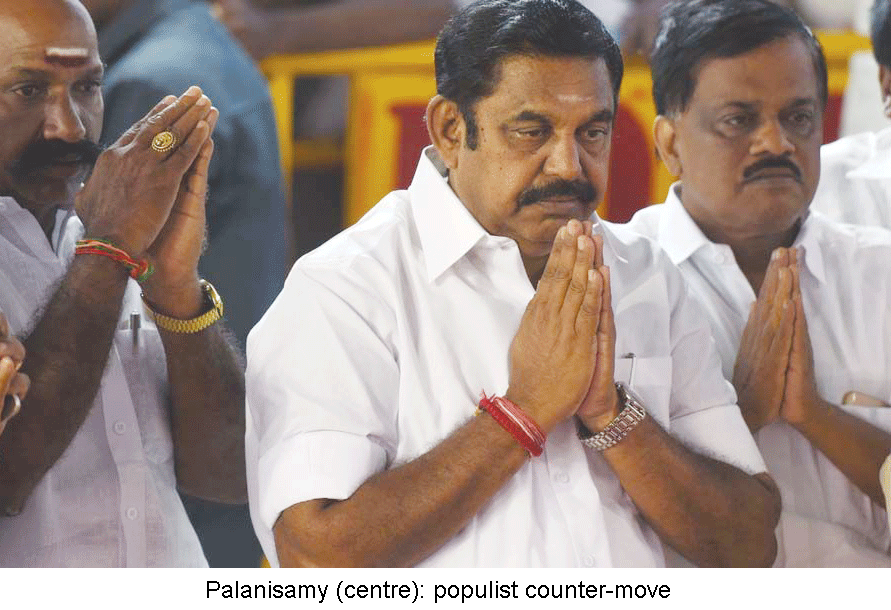 The political impasse in tamil Nadu following the sudden demise of former chief minister and All India Anna Dravida Munnetra Kazhagam (AIADMK) supremo J. Jayalalithaa on December 5, 2016, came to a dramatic end when former public works and highways minister Edappadi K. Palanisamy was sworn in as the chief minister on February 16. Two days later, Palanisamy won a vote of confidence in the state legislative assembly.
The political impasse in tamil Nadu following the sudden demise of former chief minister and All India Anna Dravida Munnetra Kazhagam (AIADMK) supremo J. Jayalalithaa on December 5, 2016, came to a dramatic end when former public works and highways minister Edappadi K. Palanisamy was sworn in as the chief minister on February 16. Two days later, Palanisamy won a vote of confidence in the state legislative assembly.
Palanisamy was sworn in after a tense ten-day power struggle in the ruling AIADMK between party general secretary V.K. Sasikala and caretaker chief minister O. Paneerselvam. However, Sasikala’s dream of becoming chief minister was rudely shattered on February 14 when she was convicted by the Supreme Court in the well-publicised Rs.66-crore disproportionate assets case, and sentenced to four years imprisonment. Nevertheless, she brilliantly managed to stage the appointment of Palanisamy as her proxy chief minister and her nephew T.T.V. Dinakaran as the all-powerful deputy general secretary of AIADMK.
To counter simmering anger and popular resentment against Sasikala and her proxy chief minister, the new AIADMK government has accelerated implementation of several of the late Jayalalithaa’s populist schemes. In particular, two Bills passed by the Tamil Nadu assembly on February 1 relating to the Supreme Court-mandated National Eligibility cum Entrance Test (NEET) for admission into undergraduate and postgraduate medical and dental colleges, have been sent to President Pranab Mukherjee for approval.
The two Bills — the Tamil Nadu Admission to MBBS and Dental Courses Bill, 2017, and the Tamil Nadu Admission to Postgraduate Courses in Medicine and Dentistry Bill, 2017 — exempt state board school-leavers from writing NEET scheduled for May 7 this year. If approved by Mukherjee, the extant system of admitting students into the state’s 22 government, 13 private and ten deemed medical colleges/universities on the basis of their Plus Two scores will remain intact. In postgraduate programmes, preference will be given to students with a year’s service in rural Tamil Nadu.
Buoyed by the success of amending the Central Prevention of Cruelty to Animals Act (1960) which exempts the annual jallikattu (bull running) sports jamboree from the ambit of the Act, the Palanisamy-led AIADMK government is determined to permanently exempt aspiring medicos in the state from writing NEET. Ever since the historic Supreme Court judgement of April 11, 2016, mandated NEET as the sole entrance exam for admission into all medical colleges countrywide, the AIADMK government and other political parties in the state have stridently protested it. There’s a political consensus that the apex court’s judgement dilutes the autonomy of the state government as it contradicts the Tamil Nadu Admission in Professional Educational Institutions Act, 2006, which abolished common entrance examinations for all professional undergraduate courses to ensure students from rural areas equal opportunity to enter institutions of professional education, i.e. medical, engineering, business management colleges/universities. Since 2007, Tamil Nadu has been admitting students into undergraduate medical and dental courses based on their class XII marksheets.
According to medical practitioners and educationists in Chennai, the hasty enforcement of NEET has placed 80 percent of Tamil Nadu’s class XII school-leavers from 53,000 government and 10,934 private schools affiliated with the Tamil Nadu State Board of Secondary Education (TNSBSE), at great disadvantage. They contend that NEET is based on the Central Board of Secondary Education (CBSE) syllabus which vastly differs from the class XII TNSBSE syllabus. “Tamil Nadu should be allowed to continue with its present admission policy for undergraduate medical education as the majority of TNSBSE-affiliated school students have never been tested in application-oriented questions that are posed in NEET. A common national test should be implemented only if there is syllabus uniformity countrywide,” says Jayaprakash Gandhi, a Salem-based careers consultant.
Sub-nationalist Tamil-pride politicians tend to gloss over the fact that the populist vote-catching interventions of the former Dravida Munnetra Kazhagam (DMK) when it was in office (2006-11) have resulted in plunging standards and learning outcomes in TNSBSE schools. The higher secondary syllabus hasn’t been revised for over a decade and the state board examination merely tests memorisation skills. As a result, students from TNSBSE schools have been finding it increasingly difficult to top — as they routinely did until 2006 — the common national exams of premier Central government institutions such as IITs, IIMs, Indian Institute of Science and Delhi University.
With informed legal opinion ruling out presidential assent to the NEET exemption Bill of the puppet Palanisamy government, and a shrinking number of students from Tamil Nadu entering medical colleges, a heavy price in terms of a looming shortage of medical practitioners will have to be paid by people of the state for reckless government interventions in education.
Hemalatha Raghupathi (Chennai)